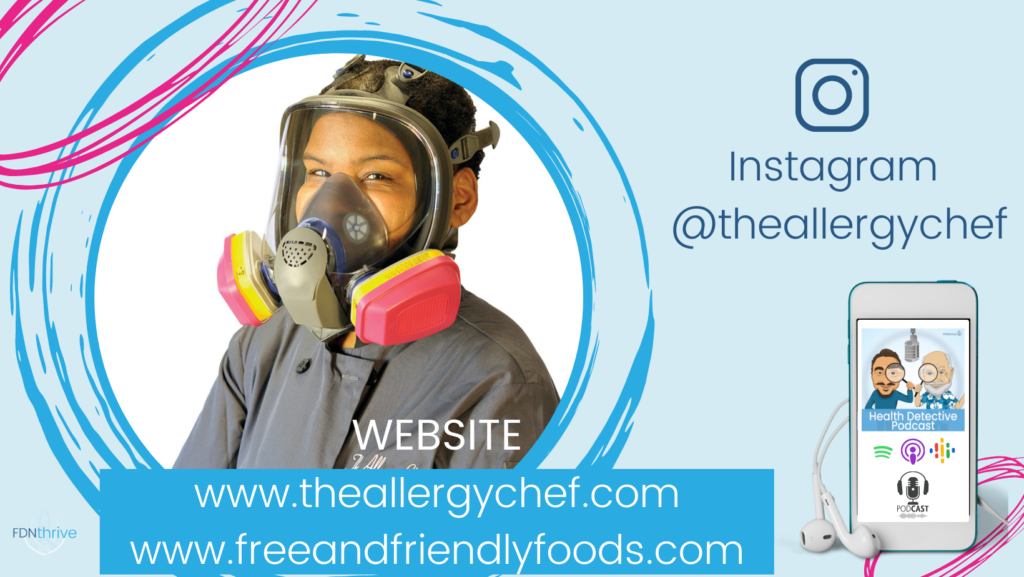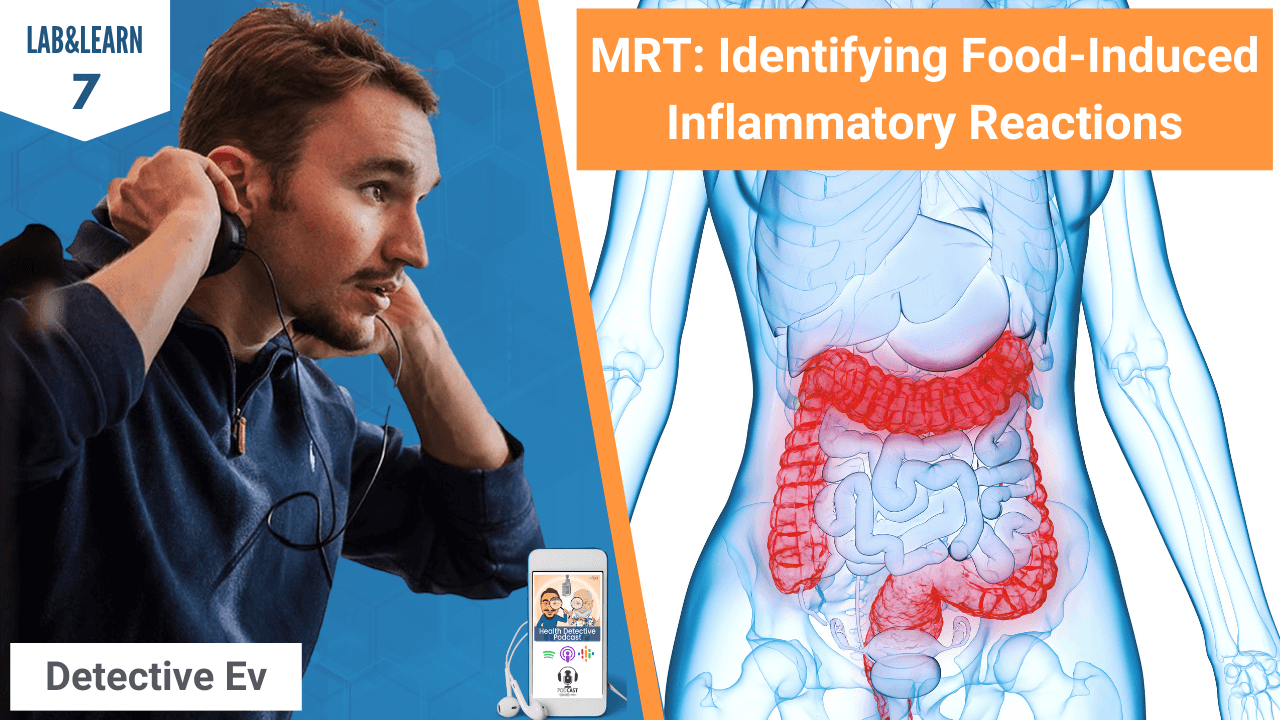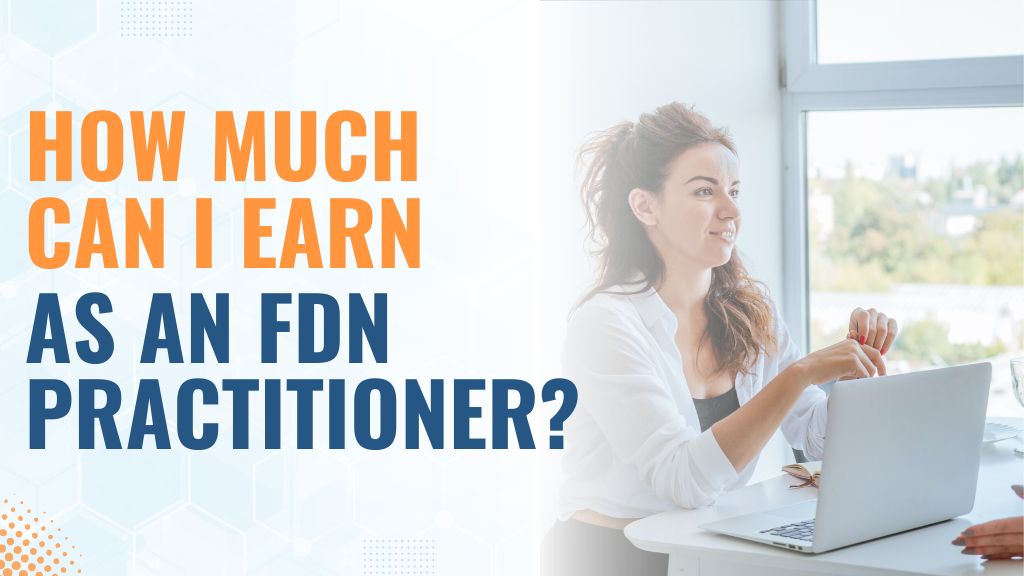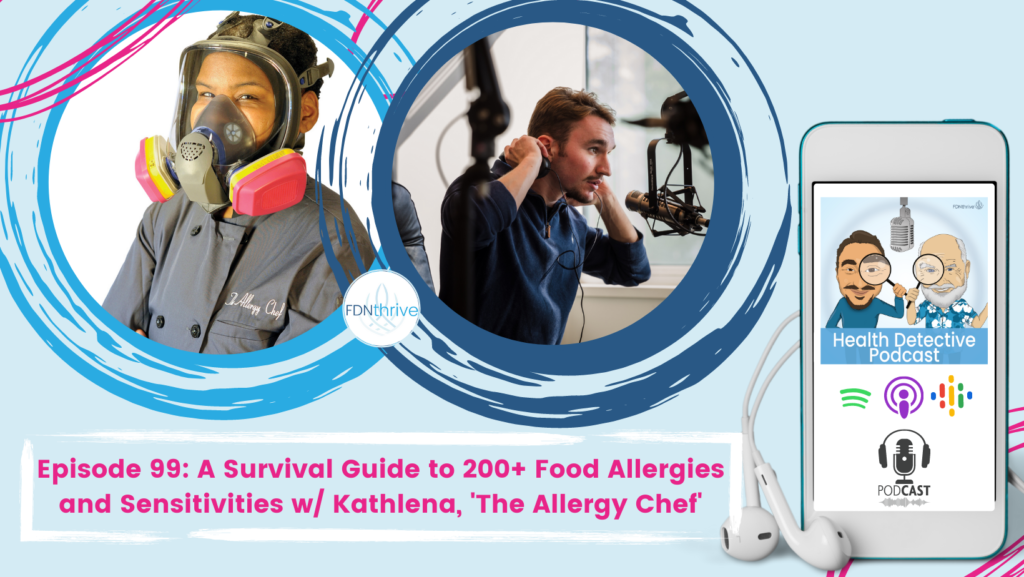
Kathlena’s Background
[00:01:07] Evan: Hello, my friends. Welcome back to another episode of the Health Detective Podcast by FDNthrive. My name is Evan Transue, AKA, Detective Ev, and I will be your host for today’s show that focuses on food allergies.
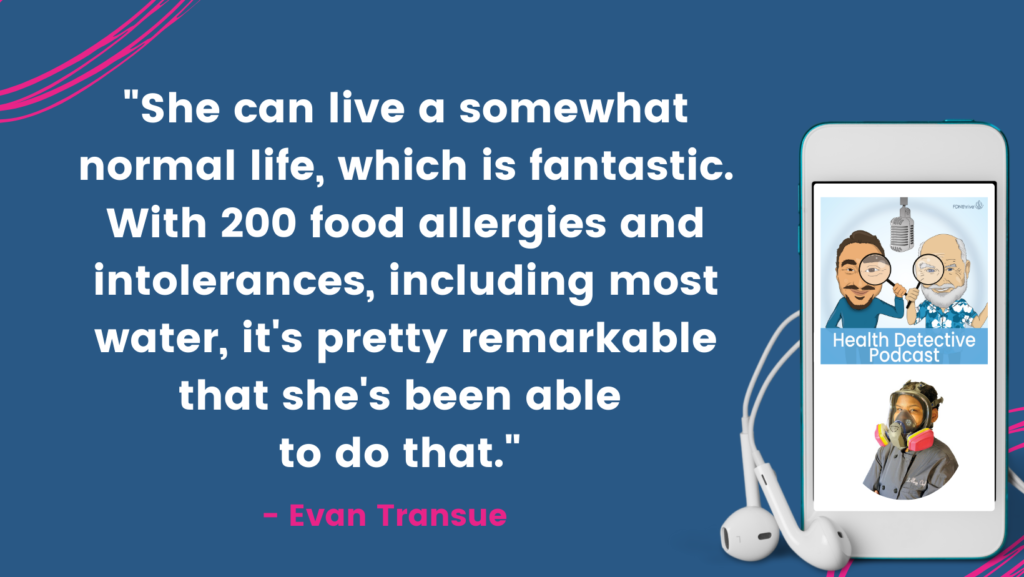
She is someone who is still a work in progress with her health journey but has been able to get to a point where at least she can live a somewhat normal life, which is fantastic. With 200 food allergies and intolerances, including most water, it’s pretty remarkable that she’s been able to do that. I know for a lot of people that come on this show, we do see complete resolutions of the things that they’re dealing with. Obviously, we have them on and we talk about it. When you hear where this woman started though, I think you’ll understand why we weren’t looking for perfection by any means to bring her on.
Her knowledge is unbelievable and the things that she’s doing for the world and especially for the community of the functional space and people with specialized diets is like nothing I’ve ever seen. She offered something to our community that’s really cool. There’s so many great things about this episode and this individual.

So, in addition to her allergies and intolerances, the members of her household also have food allergies and special diets, none of them of which are the same. After being told she only had 30 days to live, she made it her mission to help the food allergies community thrive. Three years from her lowest point, she and her team have published cookbooks, started a bakery, done nationwide outreach, developed recipes and resources and more. You can learn more at theallergychef.com.
I just want to specify this because this is important to me, if you saw the headshot, if you saw the social media excerpt that we used, and you saw this woman wearing a respirator, this is not to be edgy. It’s not to be funny. It’s nothing like that. This is actually someone who has such a serious condition that she needs to do this to keep airborne allergens from getting in her system. I hope that that’s met with respect. I can’t imagine that anyone in this community would not meet that with respect, but I still want it to specify it because it is different.
It does look like something that you probably don’t see every single day. You might not have ever seen it. I thought it was interesting when I first saw it in the sense of, okay, is this just taking this to the extreme or do we actually need this? And it is the latter. This is a person who absolutely needs this and has been through quite a lot.
She’s a heck of a warrior, man. I’ll put it this way. That ’30 days to live thing” was about five, six years ago. She’s still here to tell the tale and she has figured this stuff out to the best of her ability so far, and I don’t think she’s stopping any time soon. I’m not going to say any more. I want to get right into this one for you guys.
Without further ado, let’s get to the interview.
Introduction
Evan: Hey there, Kathlena. Thanks so much for being here with us today. We appreciate it.
[00:04:05] Kathlena: Hey, thanks for having me.
[00:04:07] Evan: Well, this is definitely going to be an interesting one. I’ve never met someone with the amount of allergies that you dealt with and these types of things. The first question I like to usually hop in with is just when did your health journey start? Was this something that began really young age or was it something that you developed over time and what did it look like?
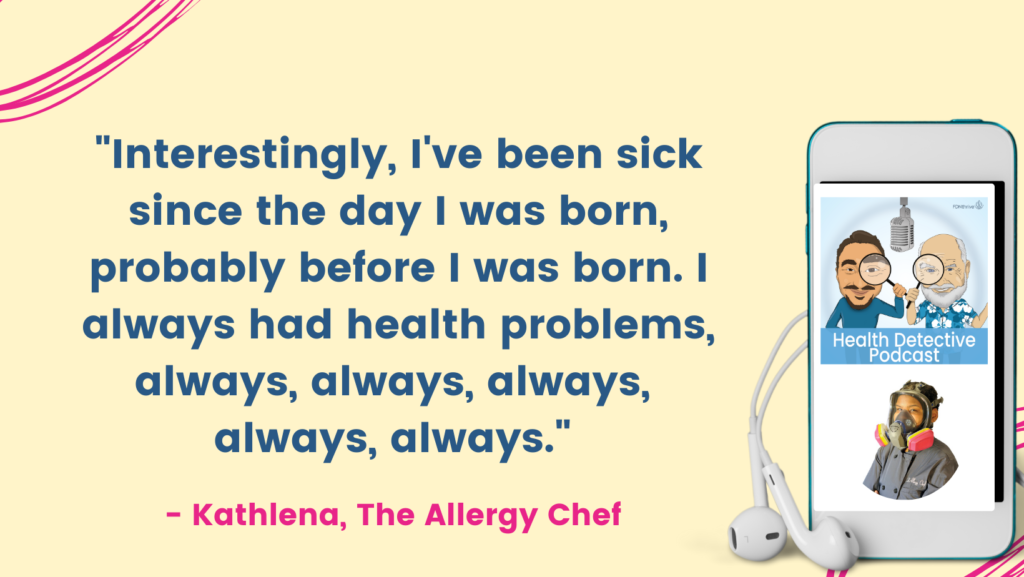
[00:04:23] Kathlena: I get this question a lot and it’s actually harder to answer than you would think. Interestingly, I’ve been sick since the day I was born, probably before I was born. I always had health problems, always, always, always, always, always. One of my very nontraditional responses to foods that I can’t process is unexplainable, intense weight gain. We’re talking up to 15 pounds in a week eating almost nothing. I was always the biggest kid you’d ever meet.

Food always gave me a problem growing up. Looking back, hindsight being 20/20, it’s been a lifelong problem. I think a better way to answer it would be, when did I become aware of the connection? And that would probably be about maybe 10, 12 years ago when things really started falling into place. Because before that, it was like, I was always being told, you know, this is the problem, or that’s the problem, or you’re the problem. You’re just eating too much. Doctors didn’t really take it as seriously as they should have. I think that especially where food allergies is concerned, this is where absolutely more awareness is needed because when I was a teenager, I basically had a 30-hour seizure.
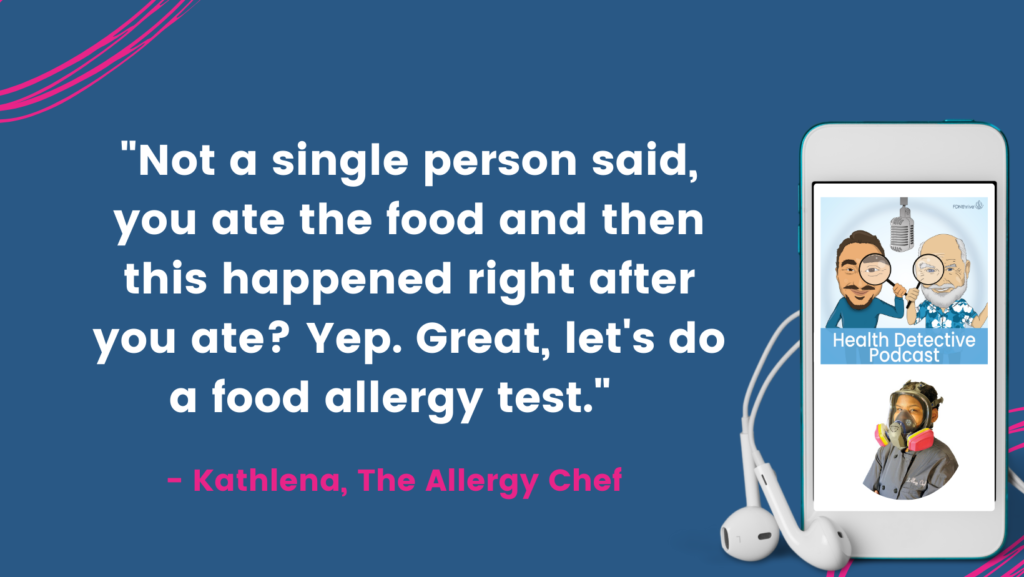
It was after this trip, and I’d eaten this particular meal and they sent in all these different specialists. It was this big deal. They kept saying what happened? And I would keep saying, I ate the food, and this started. They were like, great. Let’s do a brain scan. Let’s do a heart scan. Let’s do this. Let’s do that. Every single specialist. Not a single person said, you ate the food and then this happened right after you ate? Yep. Great, let’s do a food allergies test.
I look at this as myself now kind of going, how did that many people miss it? That many smart people, that many educated people? And the worst part was, it wasn’t like the word “allergy” wasn’t in my chart. They knew I had really severe outdoor seasonal allergies. They knew that I had problems with certain foods. But nobody ever said, hey, this kid ate the food and then their body just freaked out. Let’s do a food allergies test. Do you know how much trouble in life I could’ve been saved if just one person in that room had said food allergies tests? Just one.
[00:06:21] Evan: That’s so interesting that you word it that way because that’s sometimes all it takes is just getting the one person out of, 10, 15, 20 years sometimes of dealing with this stuff. I certainly had a different history, but where we’re very much the same is you said, you know, pretty much sick from day one, you’re kind of born like that. That’s how I felt. I mean, up until the last several years when I finally did get this stuff under control, I didn’t know what it was like to not be sick.
I just want to be clear, was it always pretty severe from day one? Because I understand that that’s way beyond excessive weight gain, but was it so extreme that you’re like, oh yes, I’m a very sick person.
This Many Food Allergies is Not Normal
[00:06:54] Kathlena: I would say in terms of extremes, maybe early twenties is when it really hit the breaking point of extreme. I think up until then, people just sort of saw it as, this kid has issues, or these are normal childhood issues.

That’s my other bone to pick with the world. This stuff is not normal. We have conditioned an entire generation of people to accept issues of health as normal. Like one in 13 with this, one in 10 with this, one in five with that. You know, we look back to our grandparents, they didn’t have all of that. Where’s the connection here? At what point do we all stop and say, hey, maybe what we’re doing, isn’t quite working out for us.
[00:07:35] Evan: Yeah, I do wonder where that line gets drawn in. It’s such a shame because what happens is most people, I find even this is true with Western medicine, we’re on this path and unless you directly see it affect you or a family member, it’s very hard to start thinking outside the box.
Then it’s amazing how many people like RNs that ended up coming to us. They’re like, yeah, I got sick. I was an RN, and I realized the system I was in wasn’t working and I had to start doing something else. I think this is really worth noting for yourself. Because I’ve always worded this correctly and I always make sure people understand what my beliefs are. But just so you guys know, Kathlena has said before we ever got on Western medicine, that’s where she’s going to go for the heart attack. That makes sense. But for these other types of things, this chronic stuff, that’s where unfortunately, that system was not really designed, it seems, to cater to people like us as you know all too well, obviously.
Everything Has it’s Place
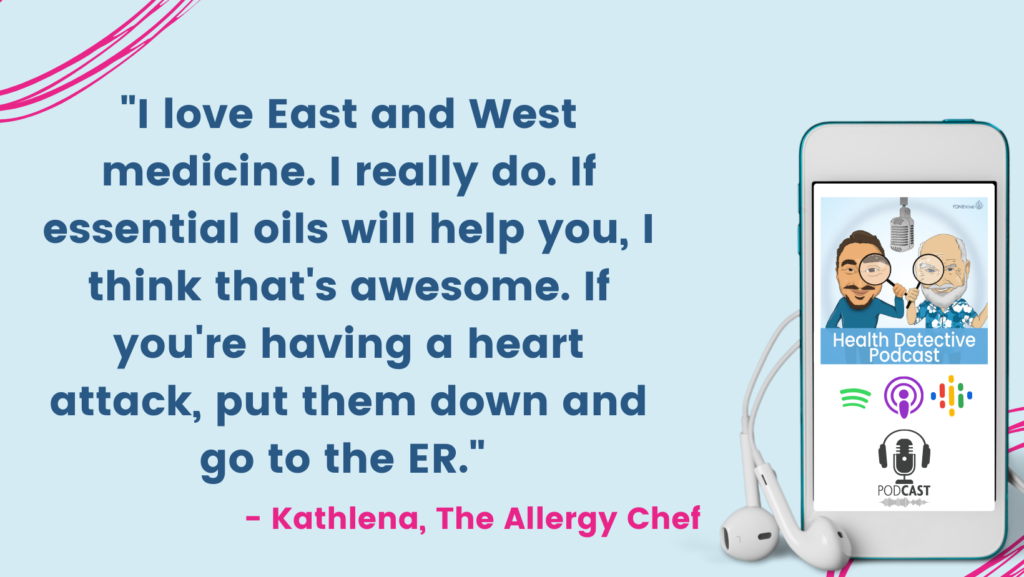
[00:08:26] Kathlena: Yeah, I tell people all the time, listen guys, I love East and West medicine. I really do. If essential oils will help you, I think that’s awesome. If you’re having a heart attack, put them down and go to the ER. There comes a point where everything has its place. Like you said, it’s for chronic illness I don’t think Western medicine is designed for us necessarily, or at least not stand-alone.
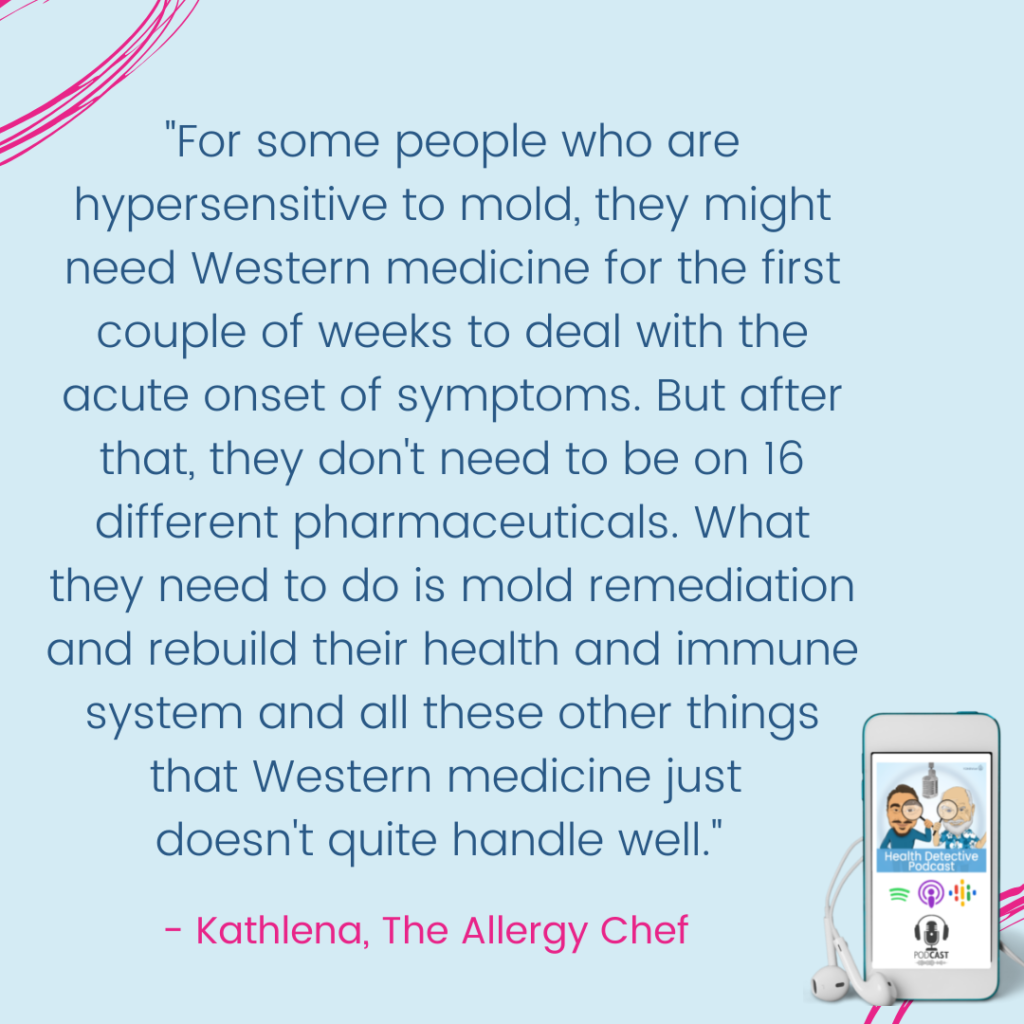
You look at people with mast cell, and I think there’s a great flow between East and West to treat chronic mast cell and to help people recover as best as they can. You look at mold exposure. For some people who are hypersensitive to mold, Western medicine only compounds the issue. They need a whole different approach. They might need Western medicine for the first couple of weeks to deal with the acute onset of symptoms. But after that, they don’t need to be on 16 different pharmaceuticals. What they need to do is mold remediation and rebuild their health and immune system and all these other things that Western medicine just doesn’t quite handle well.
[00:09:26] Evan: Absolutely.
You had mentioned that it seems like it was the early twenties when things started getting a bit more extreme. And I get what you mean by that, I think. Because there’s this time period, especially if we’re kind of born sick, where we do fall into this mental trap of thinking that it’s either normal or I just have to accept this. This is just who I am. I was born like this, and this is what it is.
Multiple Food Allergies and All the Symptoms: Extremely Abnormal
Evan: So, what does extreme look like for you? Because I feel like some of the stuff you already mentioned from earlier childhood was kind of not fun, that’s for sure. What happened that made this classify as extreme in your mind?
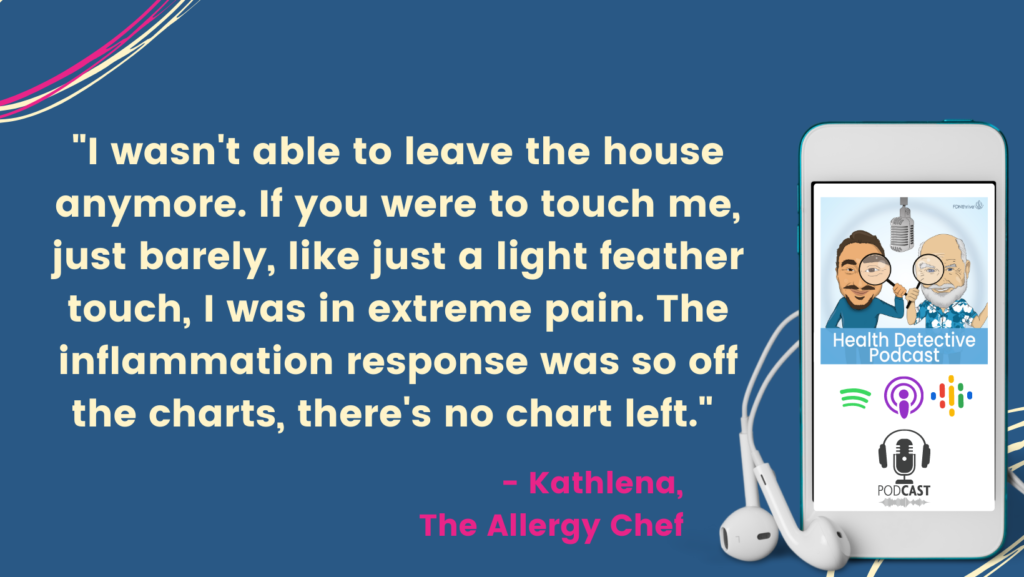
[00:09:57] Kathlena: So, I wasn’t able to leave the house anymore. If you were to touch me, just barely, like just a light feather touch, I was in extreme pain. The inflammation response was so off the charts, there’s no chart left. To me, I guess that became extreme because you’ve pegged it. When you grow up with it, it just is. If you grew up and you’re always in a wheelchair, you’re just always in a wheelchair.
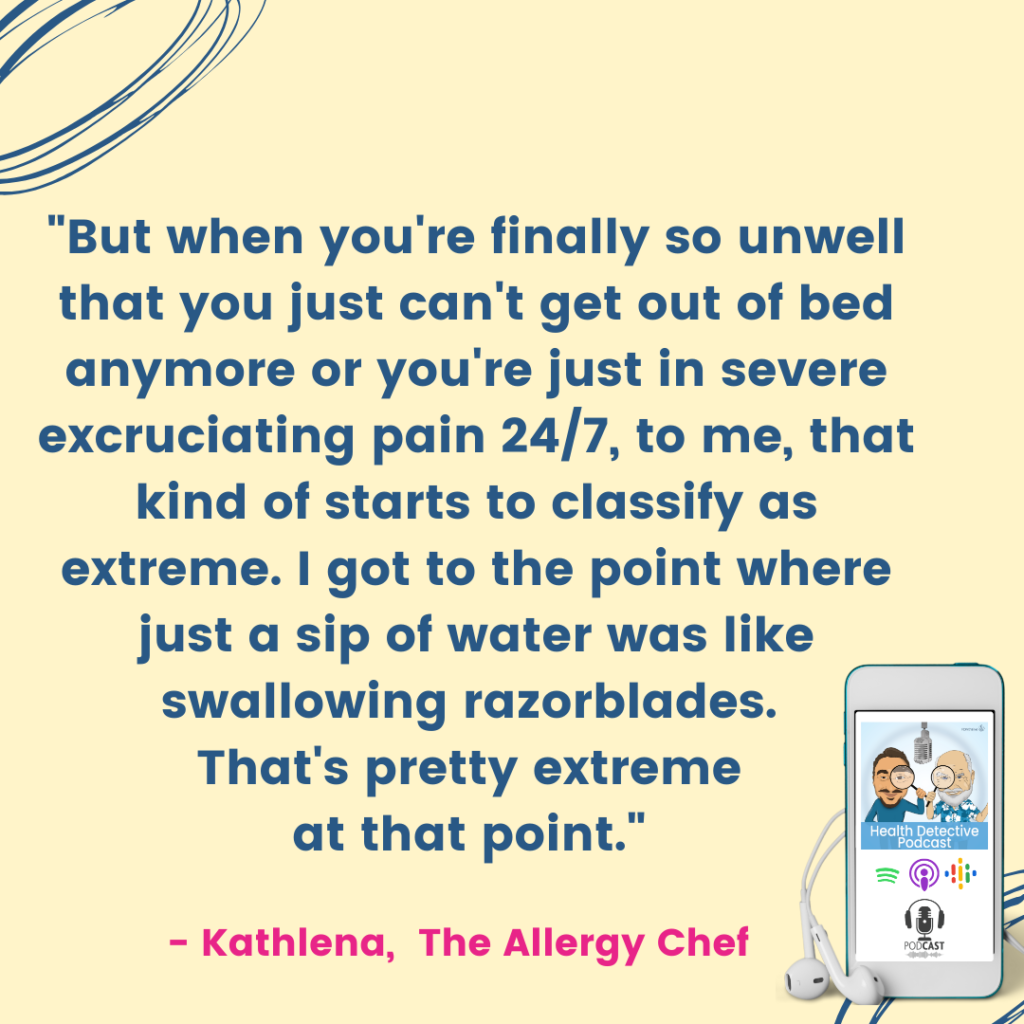
By growing up just always being not well, I was just really used to it. But when you’re finally so unwell that you just can’t get out of bed anymore or you’re just in severe excruciating pain 24/7, to me, that kind of starts to classify as extreme. I got to the point where just a sip of water was like swallowing razorblades. That’s pretty extreme at that point. I’m sure there were moments before that, that if I were to really dig deep, I could say were extreme as well, but those are the ones that really stand out. Those were the “make it” or “break it” moments, I guess.
[00:10:49] Evan: That’s I mean, wow! That’s insane. When this is happening, obviously, I would assume you’re going to doctors at this point and clearly, maybe it wasn’t helping. But what are you trying to do to get this better? What are they saying? What do they think’s happening? Because the water/razorblades thing, that’s just so scary to me.
It’s scary but it’s a great visual when you describe it like that. Cause I’m like, oh my God. I can’t even imagine such a basic necessity being such a heartache. That’s gotta to be just mentally stressful, knowing that you have to do this and that’s happening.
So, what are you trying? What are the doctors saying? What’s going on at that point in your life?
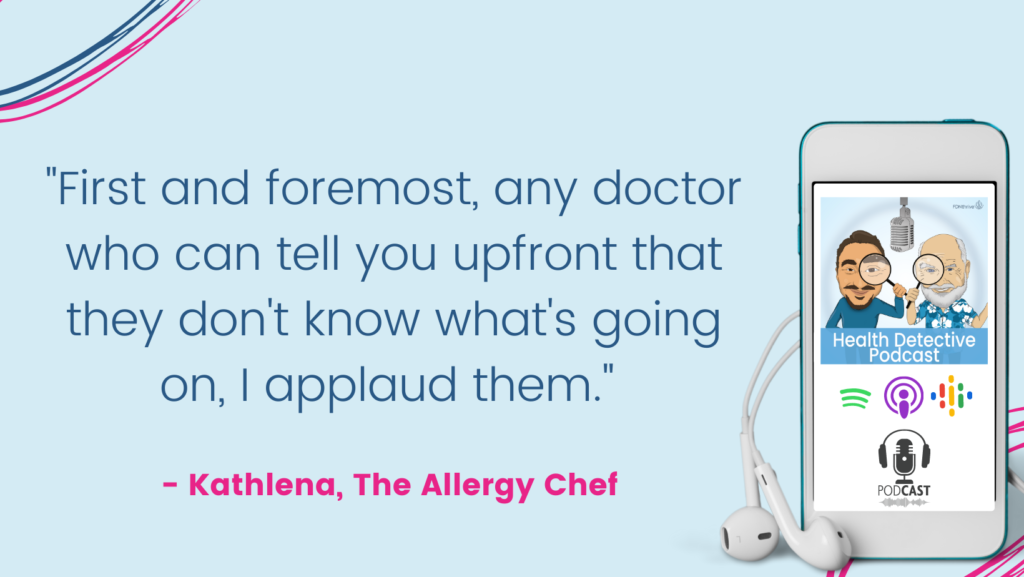
[00:11:18] Kathlena: I think at that point I had completely given up on Western medicine and believe it or not, it was our chiropractor who is also a good friend of ours, he also has a degree in neurology and he’s this really cool dude. He was like, I have no idea what’s wrong with you, but let me help you try to figure it out. First and foremost, any doctor who can tell you upfront that they don’t know what’s going on, I applaud them. Because so many specialists, they were like, oh, I know exactly what’s wrong with you. We’re going to get you on these pills and you’re going to be fine.
Food Allergies: Symptoms Can Be Illusive
And it was like, hearing that time and time again, it just sort of gets to you and you’re like, you have no idea what’s going on, it’s obvious. But of course, they want to be the smartest person in the room because there’s all these initials. So, working with him was really great because he had a network of people that he would reach out to as new symptoms were coming up. Because mind you, symptoms were not going away at all. Still going to a lot of different places and I was always being told, wow, I’ve never seen anybody this bad before. People would do what they were used to doing. That’s the unfortunate thing about my condition is I am a mimicker.
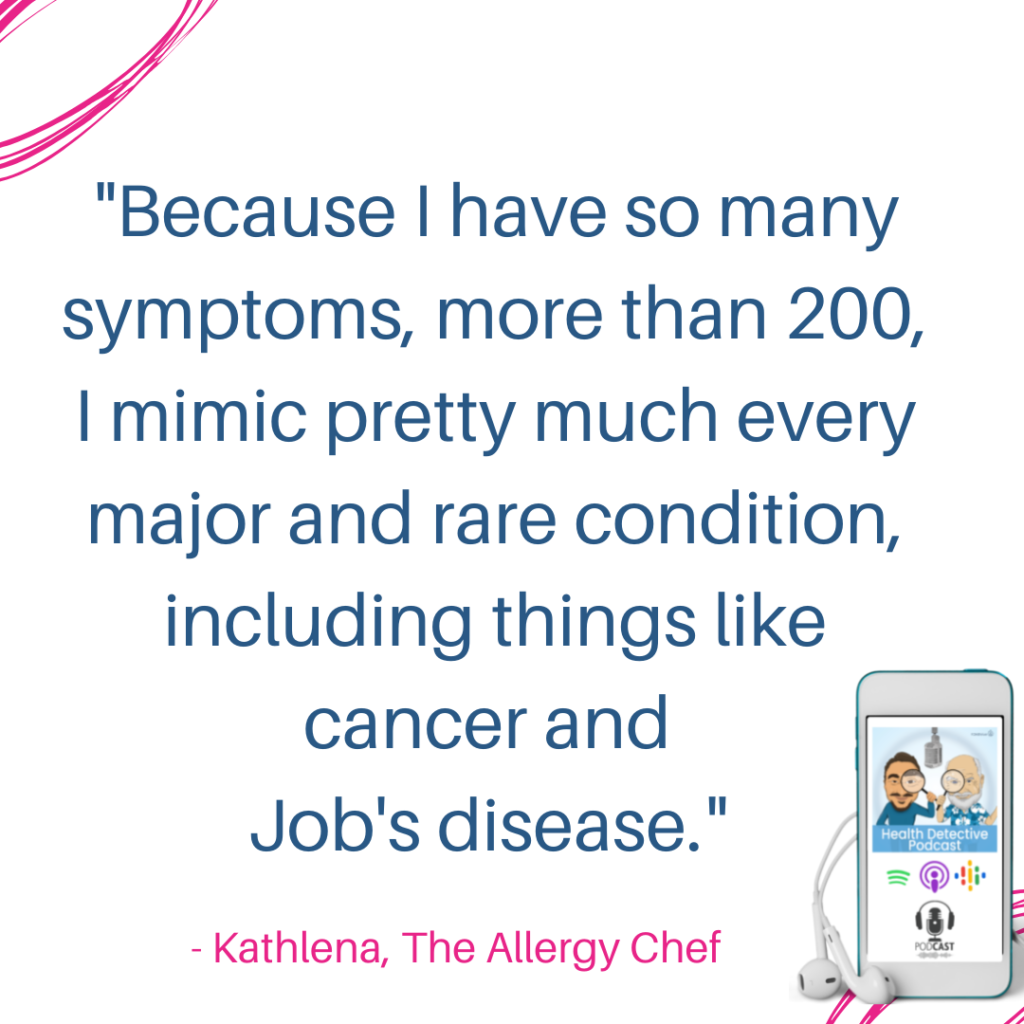
Because I have so many symptoms, more than 200, I mimic pretty much every major and rare condition, including things like cancer and Job’s disease. If I were to just go to an oncologist tomorrow, before they were to run a series of tests on me, if I were to just list off my symptoms, they would probably come up with three different types of cancer that they would think I had. I can go to a different specialist the next day, list off symptoms, and they would think they’re the one for me. When the reality is when you bundle it all up, it’s just allergic to everything.
When you remove food from the picture, I’m fine, there’s no symptoms. Good to go. I can get up; I can do my thing. I can function. I don’t need pills to get through the day or anything of that nature. You put in the wrong foods and all of a sudden, I have all these symptoms.
I love science by nature. I’m a very scientific minded, also a very creative person. I don’t know, I’m very split-brain. But to me, it was just like a series of investigations. Like hmm. We were just detectives at that point. Because what have you got to lose? It was just a matter of trying to figure out what exactly is the diagnosis at that point. Because that was going to help us figure out if there really was a path to treatment.
[00:13:29] Evan: Sure.
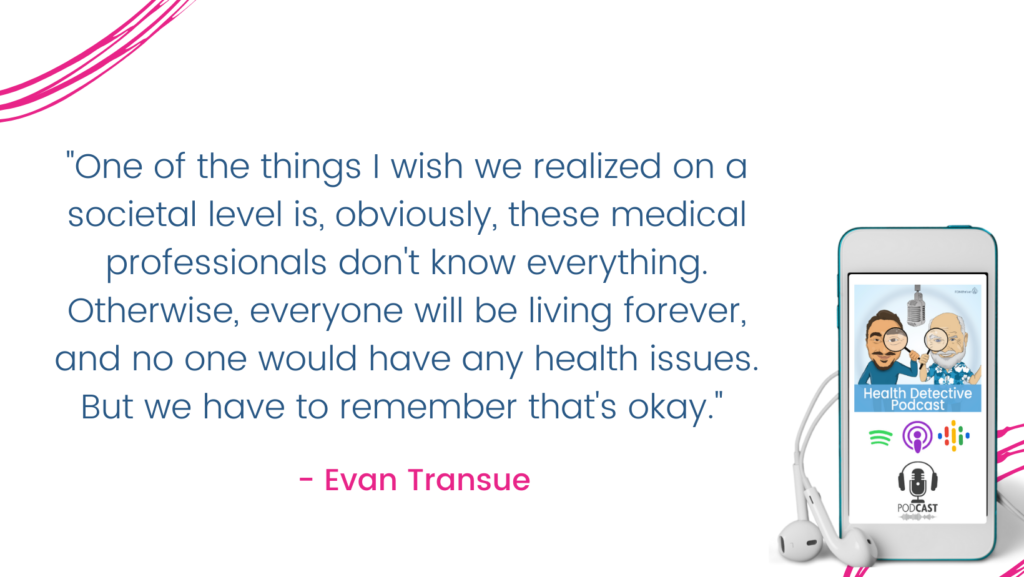
I love what you said about that chiropractor, cause I know that you said quite a few things there. But honestly, that’s one of my favorite things you just said. It’s this idea of actual humility in the medical space. Because folks, well, I’m preaching to the choir here, but one of the things I wish we just realized on a societal level is, obviously, these medical professionals don’t know everything. Otherwise, everyone will be living forever, and no one would have any health issues. But we have to remember that’s okay. I think what happens is, to the doctor’s credits out there, we put them at such a high standard, and they are placed with so much responsibility that, yeah, it must be hard when someone walks into an office and they’re like, oh my God, I have no idea what to do with this person.
And they know that you’re coming to them to help them out. But I think sometimes, especially for people like yourself or others in our community, it’s really nice actually, ironically, to hear sometimes, you know what, I don’t know what’s wrong, but let’s work on this together. Let’s try to figure this out. I can use my information. You can use some information that you’ve gotten. You could use just your experience from the condition that you’re dealing with and maybe we can figure something out. It sounds like perhaps that chiropractor at least got you in the right direction, is that correct?
Heading in the Right Direction
[00:14:33] Kathlena: Oh, absolutely.

He was the one who basically figured it all out, who gave the major suggestion that got the ball rolling. This is before gluten was a fad and he was like, a lot of people don’t do well with gluten. Why don’t you take that out of your diet? Now, mind you, because our kids have food allergies, and I already knew that I had a problem with cane sugar, and I was already aware of food being problems for certain people, depending on things, it wasn’t like there was a huge learning curve. He was like, take out gluten. I was like, oh, cool. That seemed easy enough. I felt better for the first time ever. Then we were like, clearly there’s something here.
And so that’s when we started ordering every test under the sun related to food, gut health, et cetera. That’s when it all just started rolling in like, oh, look at all this stuff you can’t have. Oh, what happens if we start taking all these foods out? And the more foods I took out, the better I felt. That’s really what it came down to. It was just taking foods out and feeling better.
Raw Water
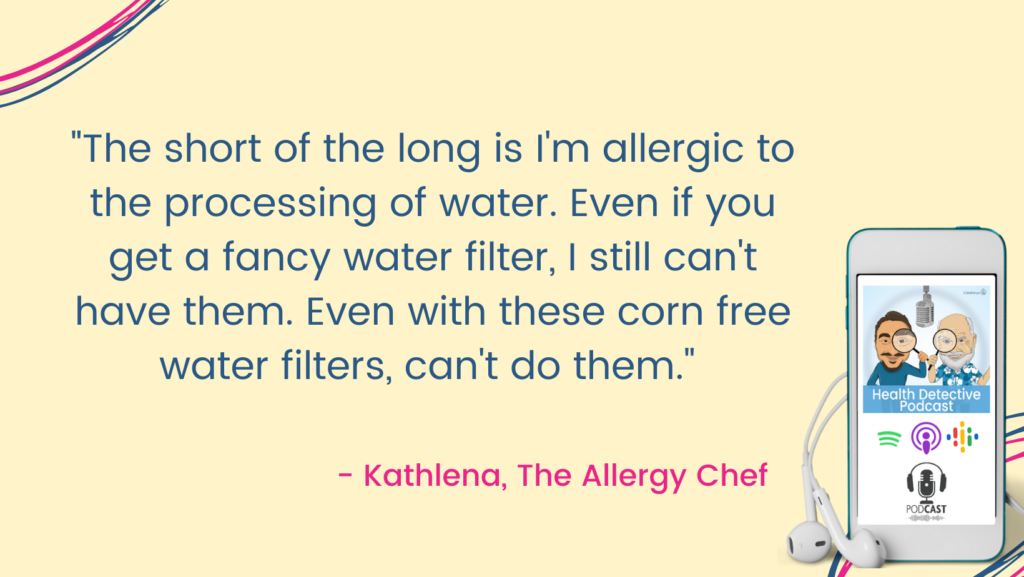
In terms of water, that actually ended up being a whole process on its own because even though foods were being removed, water never became less of an issue. The short of the long is I’m allergic to the processing of water. Even if you get a fancy water filter, I still can’t have them. Even with these corn free water filters, can’t do them. There’s a company called RAW Water Summit Spring, and they’re located in Maine. They have the only exemption in the United States to not treat the water. It is truly untreated water.
Even if you buy bottled water from other countries, which we had. There was a company, they’re called Salacious Drinks. I always like to give them a shout-out, because they are the coolest people. They got me water from all over the world trying to help find water I could drink. None of it would work.

We finally got down to Summit Spring, and that was even a godsend, because it was a total accident that I found out about that company. Brian, he was super nice. He sent me water in both plastic and glass, just in case the plastic was a problem. It turns out he has one other customer who’s just like me where we pretty much can’t drink anything but his product. His product was the first time in a very long time where I was just able to drink water and not be in pain. It was like, whoa! It was such a trip. It really boils down to, he has the only exemption to not treat the water.
[00:16:42] Evan: Oh my gosh. Wait a second. I get water from springs sometimes to the point where I’ll use something called findaspring.org. I go there and fill up the water. So, forgive my ignorance here. There is some level of processing being done even with that water?
[00:16:55] Kathlena: You know, it’s hard to say because I did the same thing. Before we had found Brian, we had looked into different springs. We live near Mount Shasta. I actually drove out to Mount Shasta and bottled water directly at the source and still could not drink it. So, is there some kind of processing? I don’t know. I can’t speak for it. All I know is Brian’s water was literally the only water I could drink, anywhere.
[00:17:21] Evan: Cool. Is that a website? Is that something anyone can buy across the country?
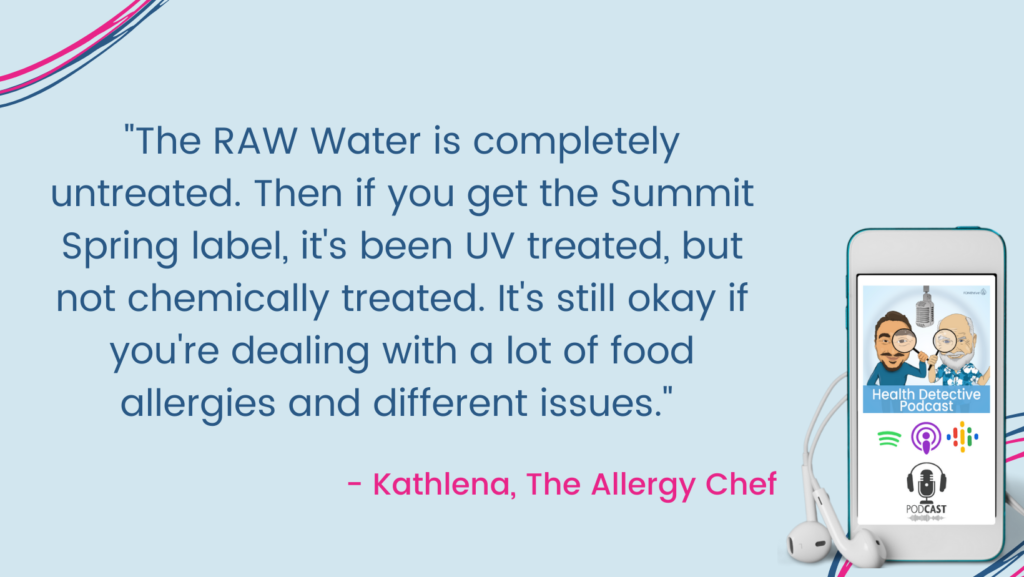
[00:17:25] Kathlena: Yeah, it’s called, I think the website is summitspring.com. But if you do a web search for RAW Water Summit Spring, you’ll find them. It’s a blue lettering and they have two lines that they do. The RAW Water is completely untreated. Then if you get the Summit Spring label, it’s been UV treated, but not chemically treated. It’s still okay if you’re dealing with a lot of food allergies and different issues.
[00:17:48] Evan: That is amazing! Thank you. This is why I love getting the privilege to do this podcast.
I mean, this is going to be episode…They hate when I misspeak for our editors. So, I shouldn’t say which episode it’s going to be. It’ll be in the high nineties, that’s for sure. To think that I have amazing people coming on, super advanced. I’ve never heard this once. I’ve never heard of the RAW Water.
So, I know the audience is gonna appreciate that. I’m just curious now from an experimental perspective, if this helped someone like her, why would I not try to get this? And just see if it helps me, see what it does. Hopefully the audience gives that a try. It’s very interesting.
Not All Springs Are Equal
It’s kind of weird to think, I thought when I was going to these springs, that might be the best of the best, but maybe there is a difference between some of this stuff. Certainly, for the average person, perhaps what I’m doing is about as good as you reasonably need to do, but I like to shoot it higher. And I know everyone in our community likes to go up to the highest level. If we can get some RAW Water from Maine, I’m about it. I’d totally do that.
[00:18:42] Kathlena: I think the average person, especially if you have great gut health and your gut barrier is totally intact and all these different things, you’re probably doing just fine. But then of course, there’s the people who want to get to the 80% and they have the special water filters and the special This and the special Thats. Then you have the people who are like, let’s get to a hundred. Let me get the best of the best of the best of every little, tiny thing I can do.
[00:19:03] Evan: Absolutely.
Yeah, I feel like that’s how I am. Because as I’ve tried to recover my health over the years, I realized, and I don’t mean that like in a workaholic way, but I am someone that I like to work. I enjoy doing a lot of things and I realized I can do that if I maintain my health. But like you said, it’s almost as if I have to keep that almost a hundred percent with my health history to maintain if I want to do 60, 70 hours a week and then I’d have to know when to rest and stuff. So, it’s a balance. I think a lot of people in our community are way overrepresented in that group that wants to go that hundred.
Now, I’m asking possibly two questions here, but I will do it at the same time. You were told at one point that you had 30 days to live and at the same time, you also find out that you have 200 allergies. Which one of those came first? Was that at the same time? I’m just like what even provoked this “30 days to live thing?” Maybe we can start there.
[00:19:49] Kathlena: It’s a good question. So much was happening all at once, seeing so many different specialists all at once at that point. I think the diagnosis of the food allergies came first and then shortly after, probably within a couple of months was the “you’re going to be gone in 30 days” because I just kept getting worse and worse and worse. Then I experienced severe wasting. I think I lost 30, 20% of my body weight. No, 30% of my body weight in 30 days.
Basically, I lost a lot of weight in 30 days. Just kind of going through that, I was just really, really, really sick. Nobody saw an easy way to turn the train around. That’s actually when we found the RAW Water. That was really the pivotal point, because that was one of the key parts. When you can’t get liquids or foods into a person, that’s a problem. Like it’s just a basic human problem. That was really the beginning of the turnaround, I think.
[00:20:42] Evan: Wow!
And I feel like I already know the answer to this, but I have to ask because it’s an allergy. It shouldn’t matter if you’re taking it necessarily orally or not. I’m assuming they couldn’t just hook you up to an IV and give you that kind of water, because that would still probably cause the reaction. Am I correct in saying that?
Severely Challenging Corn Allergies
[00:20:55] Kathlena: That would be a hundred percent correct. For me, when you’re dealing with severe corn allergies on top of everything else, corn has over 250 different uses in food, medicine, and agriculture. It’s in adhesives. If you just pick up some Scotch tape, I can’t. It’s in everything. When you take someone like me and then pump a bunch of corn into an already weakened system, you’re just going to make it a good jillion times worse at that point.
[00:21:19] Evan: Okay.
So, you find out about the RAW Water during this very serious time. I thank you first of all, for just sharing your story. And I know I’m saying that a little prematurely, but when there’s people that come on here, because we’ve had a few that they’re given these death sentences, and they’re like, hey, this is it, and probably at a relatively young age. And then they turn it around to go out and share that with other people. I think that’s one of the most important things that could ever be done on this podcast, as the Health Detective Podcast. It is an amazing and beautiful thing to show people that there’s hope for their chronic disease.

I think it’s a whole different category when we’re telling people, hey, I’ve been given an ultimatum and I beat that ultimatum. That’s pretty empowering. That’s the message that you need to hear when you’re going through something like that, because I can’t even imagine what it would be like to be told that. So, thank you.
When you’re finding the RAW Water, you said this is when things start, to some degree, turning in the right direction. What else started to go right? Because it sounds like you still have to limit a lot of different things, but I would imagine you’ve also made progress. So, what does that uphill start looking like? Well, they usually say that for uphill battle. I mean uphill in a positive way for this case. When you’re starting to trend upwards, what is that looking like just besides the RAW Water?
[00:22:25] Kathlena: I was spending a lot of time on the phone every day, finding farms that would have foods that I could eat. That’s a huge part of living with severe corn allergies. Someone like you goes to a grocery store and you can pretty much buy anything you want, well, not anything but anything within reason. Someone like me goes and the produce are covered in wax, corn-based wax. That knocks out a good 50% of produce. The other 50% of produce in the grocery store, they’re using corn-based fertilizers or corn-based pest management. That’s off the table.
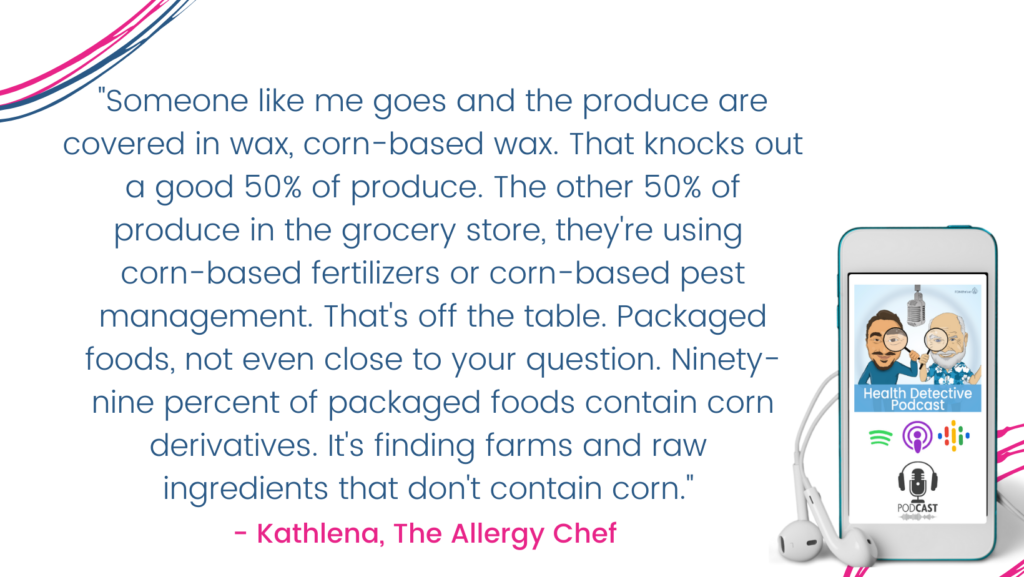
Food Allergies Alert: Corn is in Massive Amounts of Foods
Packaged foods, not even close to your question. Ninety-nine percent of packaged foods contain corn derivatives. It’s finding farms and raw ingredients that don’t contain corn. Then from there, it’s just making all your food yourself. It’s finding meats that don’t contain corn. I’m on the more rare end of the spectrum, surprise, surprise. But I can’t do meats or any kind of product from any animal fed corn.
So, finding meat not fed corn, that was a big deal. But it’s not just that, it’s now the slaughtering process and the packaging process. Because in the United States, they usually use a corn derived wash in the slaughtering process to wash the meats. It was finding a company that used the hot water wash instead. And then, they didn’t use the corn based soaking pads in the meat. It was so many steps just to get one safe thing. That was really the turning point. It’s finding 10 things. Once you finally get item number 10, you’re like, okay, I can work with this. I’ve got salt, I’ve got meat, I’ve got water. I’ve got these other things. I can make something with this.
[00:24:03] Evan: Okay.
Hey, especially if you’re going through that, I guess comparatively it’s like, all right, this is good. I could start somewhere here and work my way up. Now, just to give a timeframe, when you’re given that 30-day, basically a period to live, when was that? How many years ago was that, that that occurred?
[00:24:19] Kathlena: You know, it’s so funny. People ask me this and I never remember. I don’t know, five years ago, six years ago.
[00:24:25] Evan: That’s really what I was getting at. I’m just looking for, is it multiple years or yesterday?
[00:24:30] Kathlena: Definitely not yesterday. But no, it’s at least five years ago, at least. Maybe a little bit more than that, too.
[00:24:37] Evan: I’m getting the vibe from you, not only just because of the story, but you also listed that, hey, you’re a really science-based person. You listed off a few terms that plenty of people don’t know. Plenty of people don’t know what mast cell is. I don’t even know if I could explain that a hundred percent properly and maybe I should do some research. But the point is, you don’t strike me as someone who threw in the towel and said, great! I get my 10 foods and I get to live now, that’s going to be it.
What has this journey looked like over roughly the last five or six years? Have you come to a conclusion as to why does this happen? Because you know it’s not normal, which implies that there must be something abnormal going on. But do you know what that abnormality is?
Multiple Factors to the Whys

[00:25:11] Kathlena: Yes and no. First, I always have to preface it with, no two people are the same. We all get into this boat with a whole different series of events and that’s part of it. I think there’s multiple things at play. Number one, I think there’s a genetic component. I think you’ll always have people who are just predisposed to a breakdown of the body with the right stimulus. Whereas other people, you give them the exact same stimulus, nothing happens. They’re fine. So, you have that part.
I think there is a component of early medical interventions. I know people don’t like talking about vaccines, et cetera, et cetera, et cetera. But unfortunately, in my line of work, I’ve seen so many people with genuine vaccine injury, and I’m not even talking about the most recent one. I’m talking about the long-term vaccines that have been tried and true for 40 years. I think vaccines are great, I think on the surface, the idea of them. It’s awesome! I just don’t think they’re for everyone.
I think that there are certain group of people, and the problem is, is nobody can tell you who that group of people are. In some cases, they can. They can say, I know there’s one particular shot where if you are an African American male under the age of three, you have a greater risk of harm, than if they give you the shot after the age of three. It’s super fascinating! We have all these little caveats.
So, we know there’s a genetic component. We know early medical choices have an issue. Unfortunately, for as much as we like to say, oh, fed is best. Okay, I’m sorry. But if you give your child formula for six months, one individual formula, formula-fed vs. breastfed does make a difference, because the health of the mother absolutely can determine long-term health of the child.
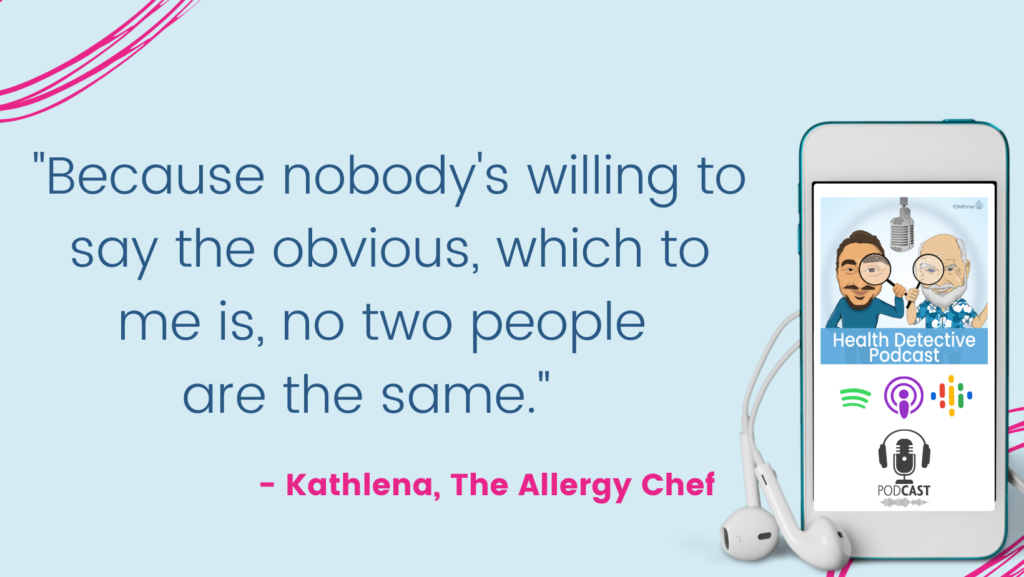
We know this. But again, it doesn’t because it’s not a true statement for everyone. I think that’s part of the reason you have these almost like divides. Because nobody’s willing to say the obvious, which to me is, no two people are the same. You can give a Child-A formula for six months, and this child was born via Cesarean and this child had every vaccine right on schedule and this child turned out perfectly fine. That happens every single day. Whereas on the flip side, we have a child with maybe even the same parent, who got the same exact treatment who came out completely different.
Therefore we know no two people are the same. It does not affect everyone exactly the same. We look at food choices. When you feed kids a bunch of crap, which unfortunately is becoming the norm, we know it becomes a problem. It’s really just this buildup domino-effect over time.

We look at society as a whole right now. This is the most true thing I could probably say in the moment. This is the greatest human experiment that nobody ever agreed to be in. Because honest to goodness, not a single medical manufacturer or food manufacturer can tell you the studied combined effect of all of these products.
They can’t tell you what happens when you expose a pregnant woman to all of the chemicals and environmental issues that we’re dealing with right now and all the additives in food. Plus, give her this child and then expose this child to all of these different interventions and all these foods and these genetically engineered products over the course of 20 years, they can’t actually tell you, in fact, they don’t want to admit it, but right now we’re getting to the point where they can tell you. And the results aren’t pretty. Instead of saying, hey, let’s clean up this system and this system and this system and this system, we’re blaming it on all these other things or we’re sweeping it under the rug and just saying, these things are normal. Okay, but they’re not.
Are “Advancements” Causing Food Allergies?
Rewind forty-five years. Rewind 50 years. In fact, let’s go back to World War II before all this stuff was introduced, before we had convenience foods, before we had all these other things. We look at the individual health of people and people were healthier. Just person for person, they were healthier people. We have to say, what happened? Well, this is what happened. Convenience. Interventions. All of these great advancements that we think are advancements. That’s what happened. Do they work sometimes? Absolutely. Are we onto some really cool ideas? Absolutely.
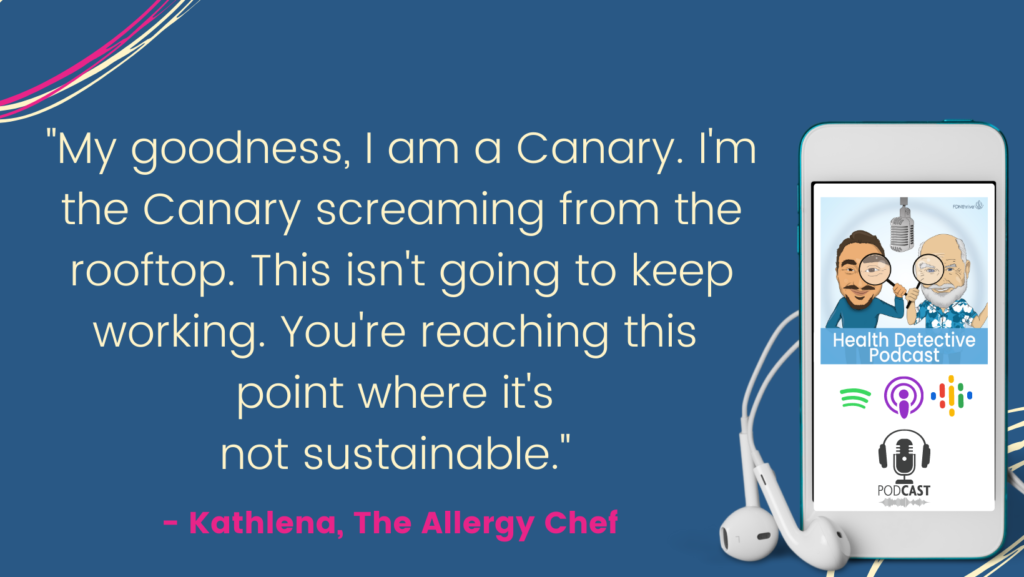
But we also have to recognize that there is a downside to all of these advancements. And people like me, they say we’re the Canary in the coal mine. My goodness, I am a Canary. I’m the Canary screaming from the rooftop. This isn’t going to keep working. You’re reaching this point where it’s not sustainable. You know? And if we were to only look at food allergies, where one in 13 are now being diagnosed, in fact, it’s even less than that at this point, that’s a problem. Because at what point do we say we can make it better? At what point do we say this doesn’t have to be this way? Because it actually doesn’t have to be this way.
[00:29:54] Evan: Yeah, absolutely.
Man, you got my ears perking up so much and I think it’s just a confirmation bias, if anything, cause I just completely agree with everything you just said in the way that you worded it, especially with the experiment. I’m a younger guy, man. When I got into this, I got into this I’m 19 years old. I was just talking to friends, and they always respected it. I mean, they got that I dealt with health issues, and they were very open to it. But it was so strange and foreign to some of them what I was saying. And I was telling them.

But as I started studying it, I’m like, guys, I don’t think this is going to be just me. I think people like myself and yourself, we happen to be the first to go maybe, or some of the first to go. But I think if we keep pushing this long enough, we’re going to see it. Now in my mid-twenties, I have friends of mine that are coming to me and they’re like, I have no idea what’s going on, but this is the exact stuff that I’ve heard you talk about. This just started happening to me last year, or this just started happening to me three years ago. I’ve been to all these doctors, but no one can help.
And so, I honestly estimate that by the time the lower end of my generation (the age of 40), if we’re going the way that we’re going right now, I think we’re going to see significantly more people with major health complications than not in that age range. That’s what I predict. I think there’s stats to back that up right now with what we’re already seeing.
The question that you posed is, when are we going to realize this isn’t working? And I don’t know how anyone in the world can listen to what you just said, because I always try to argue myself on both sides. How can someone honestly listen to what you just said, even with the vaccines, and say that that’s an unreasonable statement? You didn’t say vaccines don’t work. You didn’t say don’t take them. You said let’s acknowledge that for some people, this causes issues. I’m someone who, of all the health topics I speak on publicly, that’s one I just avoid because it’s become like religion. It’s become like politics.
[00:31:40] Kathlena: I purposely avoid it. Because people get on their high horses, especially if nothing bad’s ever happened to them. But what’s crazy to me is even people who have adverse reactions still get on the high horse without wanting to acknowledge that it’s not for everyone. And I’m like, hard pass.
[00:31:56] Evan: I want to figure out what I’m missing. But when someone like you says that, I cannot find the flaw in that. I can’t see why that is going to cause such an extreme, emotional reaction if the person’s actually listening. It is beyond me.
Let’s take Xanax for example, because that’s part of my story. It’s something I shared on this before, because I had extreme anxiety. Okay, Xanax is fantastic at taking away anxiety, at least in my experience. It also made me very forgetful. It made me feel like a zombie and it made me very angry at times. Did the Xanax not work, just because I’m complaining about some things that happened to me?
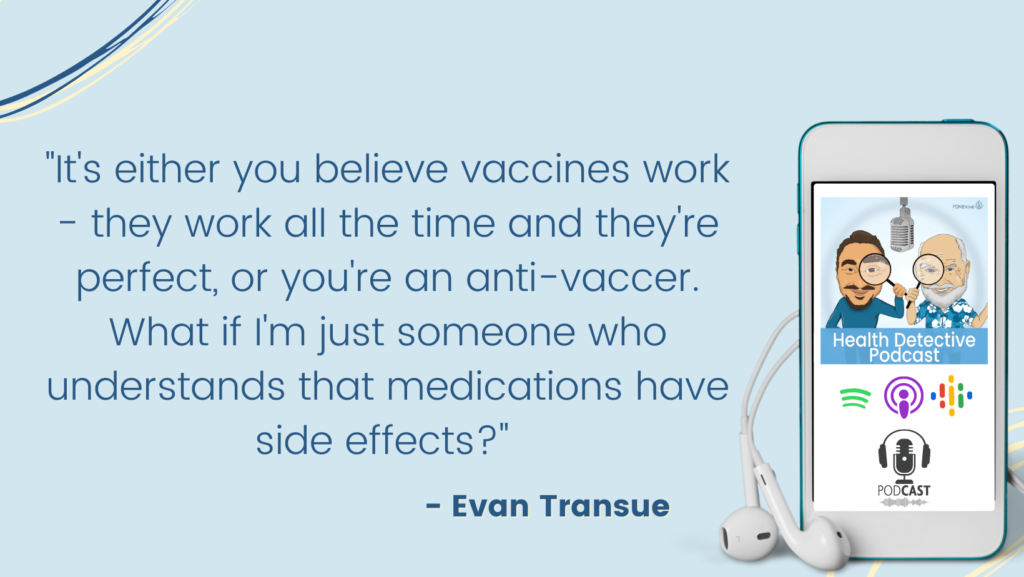
No, it absolutely worked. But it caused these other things. I don’t get why that can’t just be translated to vaccines because it’s black or white. It’s either you believe vaccines work – they work all the time and they’re perfect, or you’re an anti-vaccer. What if I’m just someone who understands that medications have side effects?
Unwelcome Questions
[00:32:46] Kathlena: The crazy part about that statement though is that lately, especially, cause you mentioned religion and that’s really what it’s like, they’re like, trust the science. Like, hold on, you didn’t know in science that we are taught to ask questions and to not trust. In fact, that’s why we have peer reviewed because the idea going in is I’m skeptical of someone else’s results. I don’t trust them. Therefore, I need to test them for myself. That’s actually one of the core principles of the scientific method. You remember you learned that in fifth grade. Can you go back that far and remember that? Because that’s what we were taught. I hear people today and I’m like, you people are crazy. I don’t know, you’ve drank some weird Kool-Aid because we can’t even have an honest conversation with some people anymore.

I think that when you reach a point where you’re not even allowed to ask a genuine question. I mean, some people, I don’t care which side you’re on, some people get really extreme and really rude and really nasty. I don’t have space or time or energy for that. But if there’s not even room for a genuine conversation or question or research, we’ve lost the battle. You know what I mean?
[00:33:49] Evan: Yeah, and that’s what scares me.
I don’t mean to go off on a side note, but you’ll understand this in a second. I’m someone who loves personality, theory, and stuff. I know that you and I must have something in common there because the way that you word things and the way that you think about it is just so much the logic that I use.
People think I’m making a stance or attacking them or whatever. I’m like, this is just a question. I’m not even saying that I’m right. But just how are we supposed to progress if everything’s dogmatic and you can’t question it? Trust the science is the funniest thing ever. As someone who studies, takes the scientific papers, and reads them as I’m sure you do.
If anyone has ever said that, I guarantee these are the same people that have probably never read a scientific paper before, because that’s not what that means. It’s assumes an inherent level of skepticism. Like you suggested that you should be questioning this, and it evolves over time. Where we realize that we thought this was great for human beings, now we realize this is probably a little better. Oh, this was good, but only with this thing in combination with it. You can’t just blindly trust the science. It doesn’t make sense.
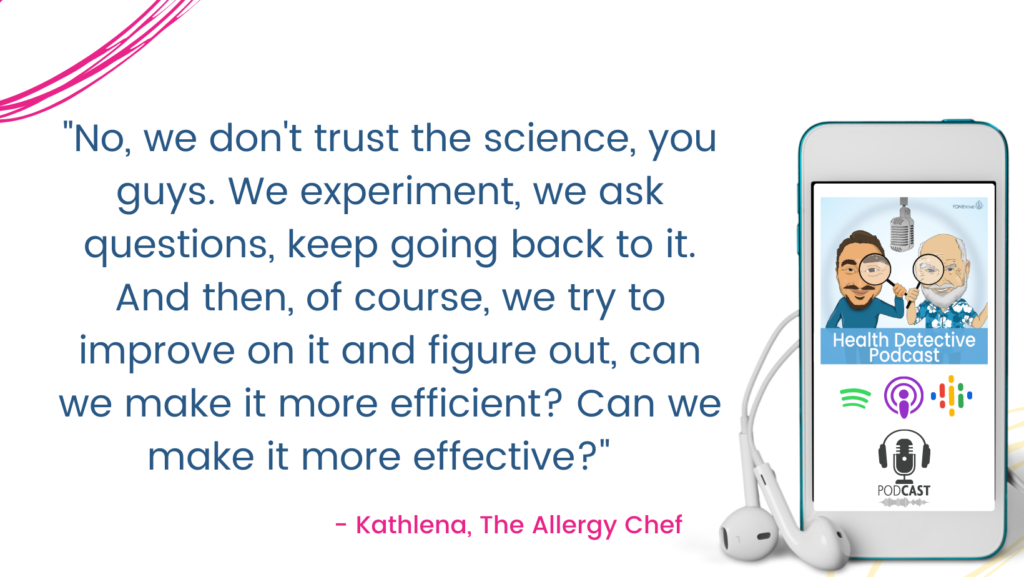
[00:34:48] Kathlena: To further drive home your point though, the FDA has recalled thousands of approved medications, meaning they’ve gone through rigorous testing. And they’ve gotten to the point where we say, we think this is going to work for a lot of people. We think it’s going to be great. After using it for X amount of time and then collecting more data, the FDA steps in and says, this is not safe. Take this off the market. Even long-term studied things, even those, we don’t have concrete, a hundred percent information on. Just the idea of trust the science. Oh, my goodness! No, we don’t trust the science, you guys. We experiment, we ask questions, keep going back to it. And then, of course, we try to improve on it and figure out, can we make it more efficient? Can we make it more effective?
[00:35:35] Evan: That would make sense to me. I don’t know what we’re missing, but it sounds good.
Well, I want to make sure that we’re able to kind of shout-out the work that you’re doing because there is probably nothing I love more than people who take what happened to them to actually go out and help others. And I think that’s incredible. How did this end up turning into this passion? Because I know that you have this allergychef.com.
Which by the way, I got to ask, is this, you poor thing, is this you and the gas mask on there?
[00:36:00] Kathlena: That’s my respirator. My respirator has caused me so much strife, because I’ve had to work for about five years and when I first started wearing it, let’s just say people were very, very, very not understanding.
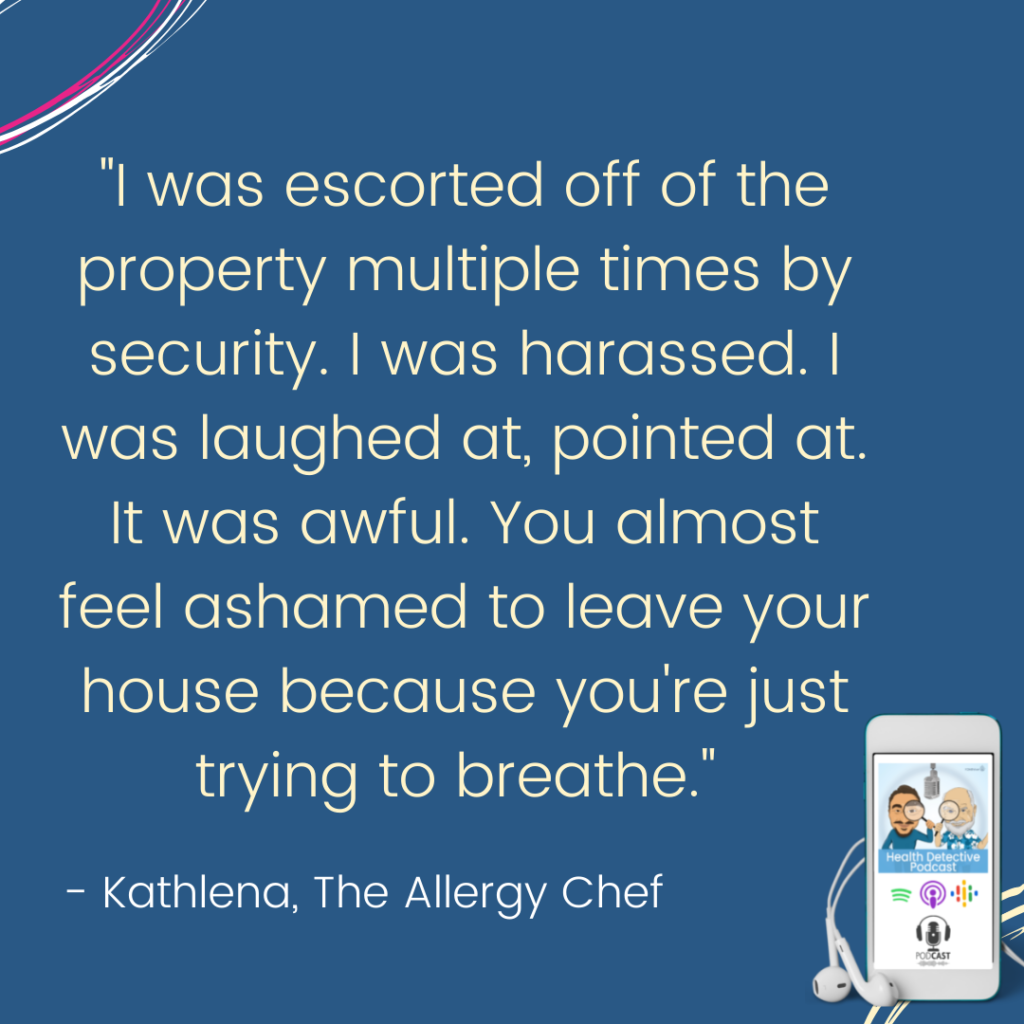
I was escorted off of the property multiple times by security. I was harassed. I was laughed at, pointed at. It was awful. You almost feel ashamed to leave your house because you’re just trying to breathe. That filter prevents airborne allergic reactions for me, that’s really what it’s all about. Because I was at the point where, again, could not leave the house safely, not without basically almost dying. That was the game changer.
What the Allergy Chef Offers
But yeah, theallergychef.com, that’s pretty much the landing page if you want to find everything that we do. The cool thing that we do, it’s called Raise. It’s a membership and it’s funny because I hate the idea of leaving people out.
When we started our bakery, it was the same story where I was like, we can’t have a bakery because the name of the bakery would be too long. They were like, well, what’s the name of the bakery? Well, it’s, gluten-free, dairy-free, egg-free and I would list out all these things. I was like we have paleo options. I was listing all these things and they were like, yeah, you’re right, you can’t have a domain name called that and you can’t have a business called that.
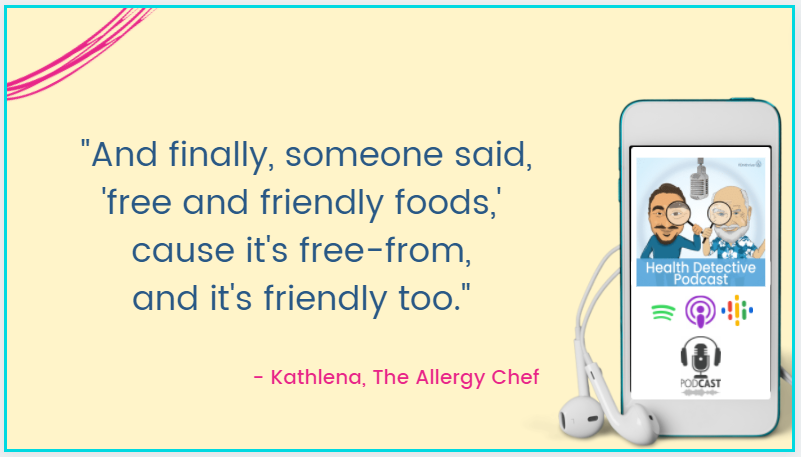
And finally, someone said, “free and friendly foods,” cause it’s free from, and it’s friendly too. I was like, we can start a business now, now that we have a name. Raise was the same thing. The R is for restricted diet, A is for allergies, I is for intolerance, S is for special diet for people who are paleo GAPS, SCD, et cetera. And then the E is for EOE. The idea is that those terms when combined, pretty much includes everyone.
Because even just the term “restricted diet” if you are doing it for a medical reason or maybe you’re just experimenting or whatever, you still fall under that umbrella. We’re here to help those people. And especially people who fall through the cracks, because if you’re coconut free AIP, nobody can help you. Or if you’re a nut free vegan or soy-free vegan or nut free paleo, all these different combinations, people don’t keep in mind.

What we call the crown jewel of the company, it’s called the advanced recipe search. It’s got more than 85 filters. We have more than 500 recipes on the platform. So, you go through, and you select individual allergens, whole food groups. Select maybe you’re allium free or can’t do any nightshade, or if you have a specific, special diet and you can put in all these combinations. And then what’s cool is it’s an “and” search. It’s not an “or.” So, every recipe that comes up at that point completely meets your needs that you entered into the system. We have people that cry tears of joy because they’re like, nobody’s ever considered a cinnamon free recipe or carrot free or all the weird things that I think of, because I know. I’ve walked a mile in your shoes, literally.
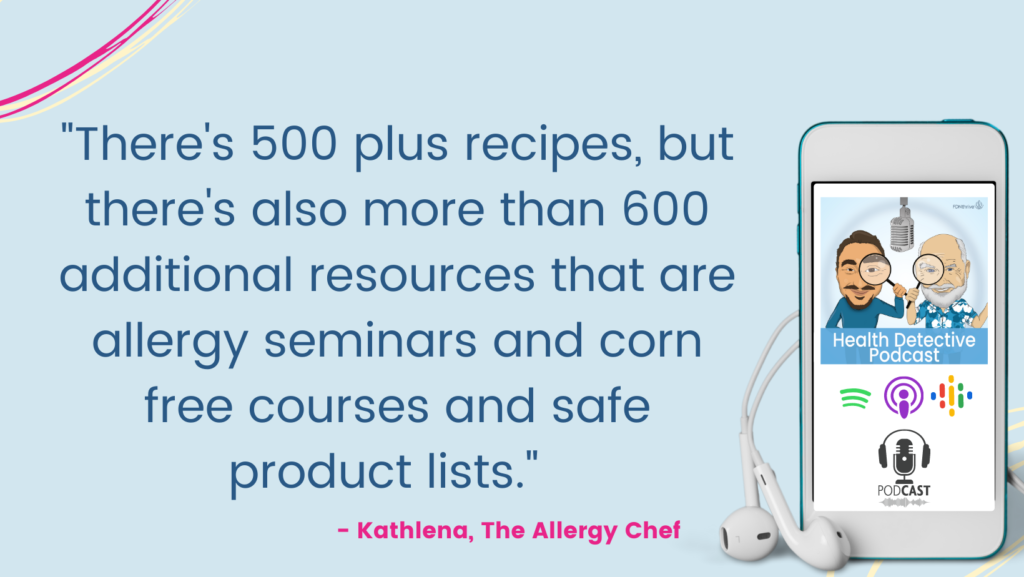
When I say, I understand, I am probably one of the few people who can say to so many people, I, one hundred percent, understand the symptoms that you experience and what it feels like to be so incredibly restricted. I get it. So, we’ve designed the system for these people. Most people come for the recipes. There’s 500 plus recipes, but there’s also more than 600 additional resources that are allergy seminars and corn free courses and safe product lists.
What I like to tell people is, it’s everything you wish you knew the day you were diagnosed. While we do have some information on how to get your diagnosis, we specialize really in helping you thrive once you have a diagnosis. Great! You know, you can’t have these 35 things. Cool! I’m going to give you every recipe that can be free from those 35 things, because my mentality is don’t tell me what to do. I’ve always been that kind of person. What it translates to in my work career is that if someone says, hey, you know, you can’t have a gluten-free XYZ that still tastes good. I’m like, you know what, watch me prove you wrong. Only because you said it couldn’t happen is why I’m making this particular recipe. That’s exactly why.

You know, at one point you asked, how does someone have 10 safe ingredients without looking for more. What happens at that point? I think for me, in a weird way, I feel like I’ve reached the end of the line. I essentially have my diagnosis. I know what’s wrong with me. I could probably spend years and a truck ton of cash investing in maybe getting 10 more foods, 20 more foods or whatever.
But at this point for me, I feel like my time and energy is better well spent making sure that everybody else can take from it. Because at the end of the day, what I’ve done in the past three years on the Raise platform, if I were spending every day still trying to work on myself, there’s no way I could have done it all. Now we have over a thousand resources for people and for families.

One of the worst reactions I had once, I was laying in bed and I’m like, God, I hate this so much. And if one child can benefit from the pain I’m experiencing in this one moment, I’ll be okay with it. I won’t complain. I’ll just shut up and deal with it. Looking back, we’ve helped so many children. So many parents come to us and they’re just like, my kid can eat because of you. You’ve created all this stuff and I didn’t know how to feed my child and I can now. That’s the impact that we’ve made.
That’s kind of the moral of the story, I guess. Take something bad and turn it around and do something else with it, because I think there’s something there. And if we can just get to a point where, as a society, we, as consumers, demand better, I think we’ll all be better off for it. We’re at this weird point where, with the economy the way it is, it’s really hard to demand better. Because you can’t show me a reasonable person who walks into a grocery store and sees a loaf of bread for $2 or two apples for $2 and doesn’t choose the loaf of bread. Mind you, they didn’t read the ingredients on that loaf of bread and mind you, they don’t realize that that loaf of bread is $2 for a reason.
Connection To Food Can Help Avoid Food Allergies
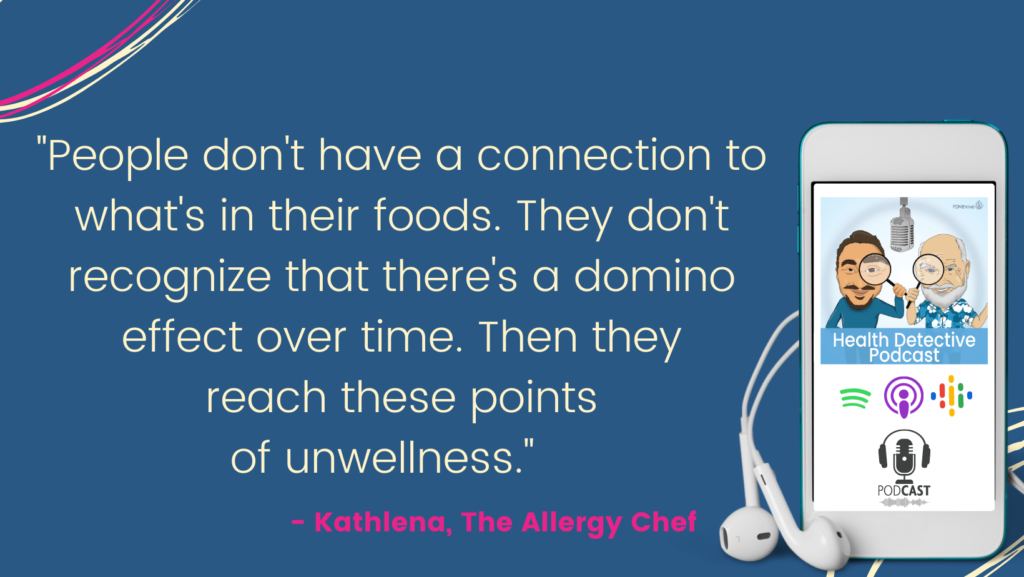
But common sense is, pick the loaf of bread, more calories, more sustenance. It makes more sense. Your dollar goes further and that’s the problem. We’ve taken bits of core education out of childhood, out of schools, out of whatever. People don’t have a connection to what’s in their foods. They don’t recognize that there’s a domino effect over time. Then they reach these points of unwellness. Then they feel it in their checkbook where it’s $2 for a couple of organic apples when I could get the standard apple and I could have 10 of them or whatever.

They don’t understand what they’re paying for anymore. Personally, I feel like we shouldn’t have even gotten to this point. Our grandparents didn’t have to recognize the difference between organic and not organic. They didn’t have to look for genetically engineered labels or whatever, because it didn’t even exist. But now we’ve introduced all this stuff and then it’s, if you don’t want to take part in that system you have to pay more. That almost seems backwards to me.
And then of course, people don’t realize the true cost of food. So going back to that $2 loaf of bread. Yes, it was $2 upfront. But how much did you pay in all your medication in the long haul? People aren’t seeing the combined cost of poor food and health choices. Every time you choose not to move your body and not to treat your body well, how much will you pay later?
[00:43:00] Evan: It’s well said, and I love the the mission and the motivation behind it.
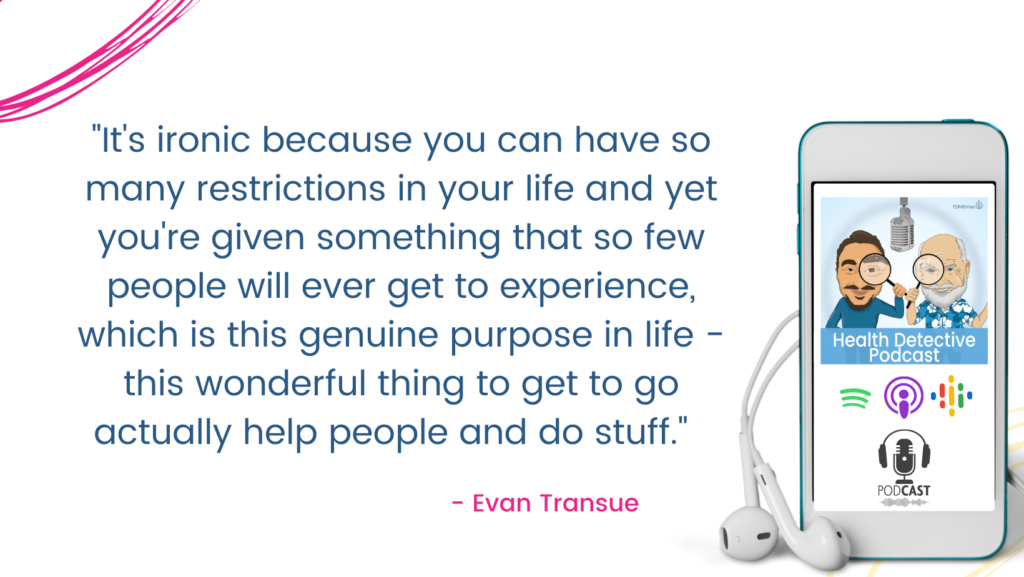
I think I can’t understand the allergy thing, not at that level, that’s for sure. I think a lot of us here understand that more than we could ever express this idea that, if we can go out and turn this into something that gets to help other people or give them a little bit of freedom or give them some relief, because we know what it’s like to be relieved to any degree after years of suffering. Yeah, I think that’s a pretty amazing way to live. It’s ironic because you can have so many restrictions in your life and yet you’re given something that so few people will ever get to experience, which is this genuine purpose in life – this wonderful thing to get to go actually help people and do stuff.
And I want to make sure people get the full shout-out here. They know where they can find everything. Your scheduler had told me that there was even some kind of discount possibly for the community. Now I understand what it’s for because I told Kathlena before this, I don’t know if our audience realizes this. Guys, I like to go into these interviews just ignorant enough so that it’s a genuine conversation. I know it’s working because so many of you guys say, you love the conversations. I think that’s why. I didn’t even realize what that Raise membership was. I mean, that is cool as hell. I’m interested in that, that’s for sure. I’m interested in the bakery. Do me a favor, shout out where people can find everything. Shout out about the discount, whatever you want. Then I’d love to ask you one more question after that.
Where to Find Kathlena
[00:44:13] Kathlena: Our raise membership is just, go raise (R A I S E .net) or you can go to theallergychef.com and there’s a link to get there. There’s also newly diagnosed. It’s a free program on theallergychef.com for anybody who needs that. But the discount is detective50 and you’ll save 50% on your first month of a Raise membership. You can use that discount for a year from today.
The bakery is freeandfriendlyfoods.com. I do have to warn you. It’s not going to be staying open forever. We’re kind of moving in a different direction. If you’re in the San Francisco Bay area, you can definitely put in an order. What’s really cool is, all of our stuff freezes for four months. Because when we started, our whole goal was to make sure that food allergy families could have a stock because that’s a huge part of dealing with food allergies. It’s just having access to safe food overtime. Those are the main two things.
But again the theallergychef.com that takes you to everything. You can see our cookbooks. But honestly, the Raise membership, it’s the way to go. The advanced recipe search is the coolest thing that most people don’t even realize that they needed in their life. And then you have access to all the tools and resources there.
[00:45:18] Evan: Yeah.
Well, you just said that at the end. I know I needed it. I just didn’t even know something like that existed. That’s really cool. I think a lot of our community would be able to relate to that.
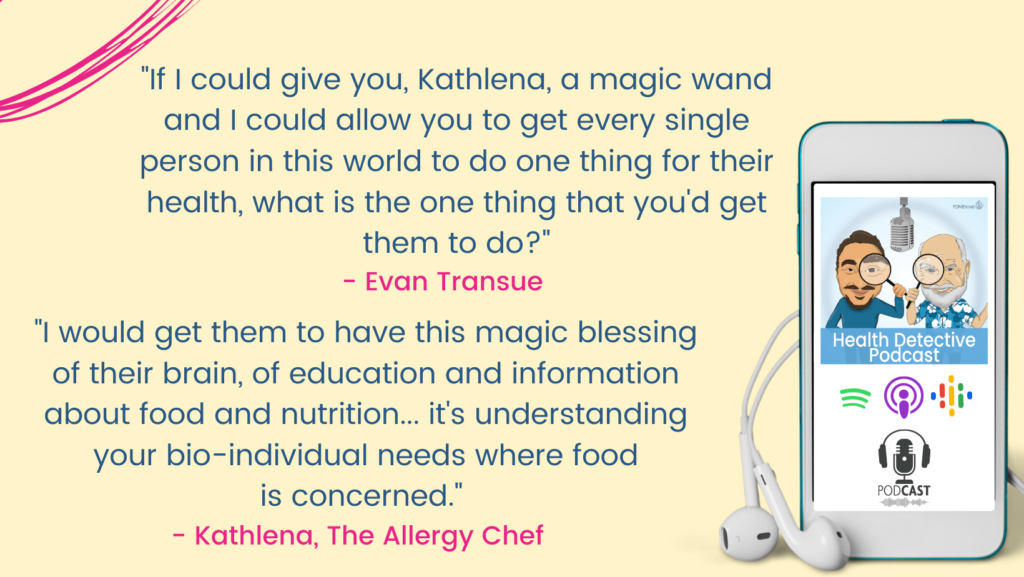
We got to wrap up, but I want to ask you our signature question here on the Health Detective Podcast. And the final question that we always finished with is, if I could give you, Kathlena, a magic wand and I could allow you to get every single person in this world to do one thing for their health, whether that’s literally do something or stop doing something, what is the one thing that you’d get them to do?
[00:45:49] Kathlena: I think I would get them to have this magic blessing of their brain, of education and information about food and nutrition, where it comes from, the importance of it all, why you should be limiting high-fructose corn syrup. Honestly, you shouldn’t be having it at all. But especially for those who are eating Western foods and things like that, just understanding how that’s one of the best things that you can do for yourself and your family is just to consume the right kinds of foods that nourish you. Because even still, maybe tomatoes don’t nourish you the way an apple does. And it’s understanding your bio-individual needs where food is concerned. Because when you do that, I think mostly everything will fall into place.
Conclusion
Guys, theallergychef.com, theallergychef on Instagram. This is where you can find her. Don’t forget about the discount code that she offered our community. Super appreciative of that. I’m going to try that thing out because I knew I needed that.
[00:46:34] Evan: You know, man, I don’t know what it is, but we hear things on this show all the time if you’re an active listener, you know how crazy the stories get. There’s something about each one that’s just, it hits so differently. Do you know what I mean? It’s just a completely different experience every time. The emotions are similar, but the experience is different in a way. Because the stories are just so out of this world. I’ve never even heard of something like this. I’m so glad that we ended up getting her on the podcast.

I mean, what an inspirational thing. How do you take something like this and turn this around into something so beautiful and positive? I love stories like this, not only from the health perspective but also from just the life perspective. There are so many people out there, I was one of them at one point, who are just suffering, who are just stuck, who are just thinking there is no point to this life. Why am I here? Why bother? And when you hear something like this, it’s not that we ever want to compare our pain to someone else’s. I don’t think that’s a good strategy. But man, if you gotta, how much worse does it get? This is something pretty serious. I think we need to actually think about what it would be like to live a life like Kathlena has to live.
And then think about the fact that, not only did she work through that, she has a family, as she said. She started this wonderful business. She started a couple businesses and she’s using this to help others. When she said, I hope you guys caught this, when she said the part about, she was in bed, she was in pain. And if she could help only one person, one child, that’s why she had to feel this way, then it will be worth it. That’s a special kind of individual, and one I’m extremely glad that we got to have on the show.
Kathlena, thank you so much, if you are listening, very much for coming on. We appreciate you.
But thank you guys so much for listening to another episode of the Health Detective Podcast by FDNthrive. As always, I’m your host, Evan Transue, AKA, Detective Ev, and we are looking forward to talking to you guys again soon.
Take care.
[00:49:12] Thanks for tuning into the Health Detective Podcast. If you are ready to finally work with a real health detective on your health journey so that you can get well and stay well naturally, visit us at fdnthrive.com and click the button to Schedule a Free Health Review.


